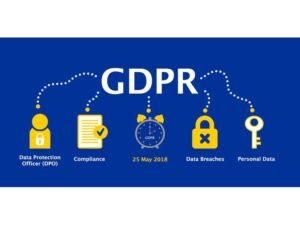Understanding GDPR and Its Impact on North American SMEs Businesses: How GDPR Affects Data Protection Strategies for SMEs in the USA and Canada
In the interconnected world of global commerce, data protection laws enacted on one continent can have ripple effects across the ocean. This is particularly true for the General Data Protection Regulation (GDPR), a comprehensive data protection law that has set the gold standard for privacy and security worldwide. For North American small and medium-sized enterprises (SMEs), understanding and complying with GDPR is not just a legal imperative—it’s a strategic advantage. This article will guide you through the essentials of GDPR, its impact on North American businesses, and strategies for compliance.
Simplifying GDPR for North American SMEs
GDPR is a set of regulations designed by the European Union to protect the privacy and personal data of its citizens. It came into effect on May 25, 2018, and It applies to all organizations, regardless of location, that process the personal data of EU residents. GDPR’s reach extends far beyond Europe’s borders, affecting North American businesses that engage with European customers, whether through e-commerce, data processing, or simply by having a website accessible in the EU.

Impact of GDPR on North American SMEs
The impact of GDPR on North American SMEs cannot be overstated. At it’s core, GDPR is designed to give individuals more control over their personal data while simplifying the regulatory environment for international business. It emphasizes transparency, security, and accountability by organizations, mandating strict data handling and protection measures. For North American SMEs, the GDPR’s extraterritorial scope means that even without a physical presence in the EU, if they offer goods or services to EU residents or monitor their behavior, they must comply with GDPR requirements. Failure to comply with GDPR can result in severe penalties, including fines of up to 4% of global revenue or €20 million, whichever is higher. This regulatory framework has made it imperative for SMEs in the USA and Canada to understand and implement GDPR requirements.
Controls and Requirements of GDPR
The GDPR imposes stringent controls on how personal data is collected, stored, processed, and shared. Key requirements include obtaining explicit consent for data processing, ensuring data accuracy, implementing data minimization principles, and establishing clear data retention policies. It introduces concepts like “lawful basis for processing” and “data minimization,” requiring businesses to justify the data they collect and to collect only what is necessary. Moreover, it grants individuals unprecedented rights, including the right to access their data, right to be forgotten, and right to data portability.
Also, organizations must be able to demonstrate compliance through adequate documentation and practices. In addition, appointing a Data Protection Officer (DPO) to oversee compliance, conducting Data Protection Impact Assessments (DPIAs) for high-risk data processing activities, and promptly reporting any data breaches to the relevant authorities.
Data Protection Strategies for GDPR for SMEs in the USA and Canada
Data Protection Strategies for GDPR for SMEs in the USA and Canada
To navigate the complexities of GDPR, SMEs in North America must adopt robust data protection strategies. These strategies should include
- Data Mapping and Inventory: Understanding what personal data is collected, where it is stored, and who has access to it is crucial for GDPR compliance
- Privacy Policies and Consent Management: Ensure your privacy policy is transparent, easily accessible, GDPR-compliant and implementing effective consent management processes.
- Data Minimization and Storage Limitation: Minimizing the collection and retention of personal data to only what is necessary for business purposes.
- Data Security Measures: Implementing technical and organizational security measures to protect personal data from unauthorized access, disclosure, or loss.
- Employee Training and Awareness: Educate your employees about GDPR and their role in maintaining compliance, particularly those who handle personal data.
- Privacy by Design: Integrate data protection into new business processes, systems, and products from the start.
- Establish Data Breach Protocols: Have a clear plan for responding to data breaches, including notifying affected individuals and the relevant authorities within 72 hours, as required by GDPR.
- Appoint a Data Protection Officer (DPO): If your processing activities require it, appoint a DPO to oversee GDPR compliance and act as a point of contact for data protection authorities.
Fun Facts: Did You Know?
- GDPR has inspired other similar regulations worldwide, including the California Consumer Privacy Act (CCPA) and Brazil’s General Data Protection Law (LGPD).
- The first company to be fined under GDPR was a Portuguese hospital, for allowing indiscriminate access to patient data.
- The largest GDPR fine to date was imposed on Google in January 2019, amounting to €50 million.
- GDPR introduced the concept of ‘right to be forgotten,’ empowering individuals to have their personal data erased from certain databases.
- GDPR has impacted website design, with “cookie consent” notices becoming a ubiquitous part of the internet landscape.
These fun facts highlight the importance of GDPR and that it should be taken seriously.
Conclusion: Your Business, Our Priority
GDPR has revolutionized the way businesses handle personal data, and SMEs in the USA and Canada are no exception. As daunting as GDPR may seem, it offers an opportunity for North American SMEs to strengthen their data protection practices, build trust with their customers, and potentially gain a competitive advantage. Compliance is not just about avoiding fines; it’s about demonstrating to your customers that you value and protect their data.
If the intricacies of GDPR still seem overwhelming, or if you need help understanding GDPR requirements and implementing compliance measures, don’t hesitate to reach out. We’re here to assist you in navigating the complex landscape of data protection. Feel free to book a discussion session with us and together, we can turn GDPR compliance into a competitive edge for your business.
Remember, in the battle for business security, the best offense is a good defense.

